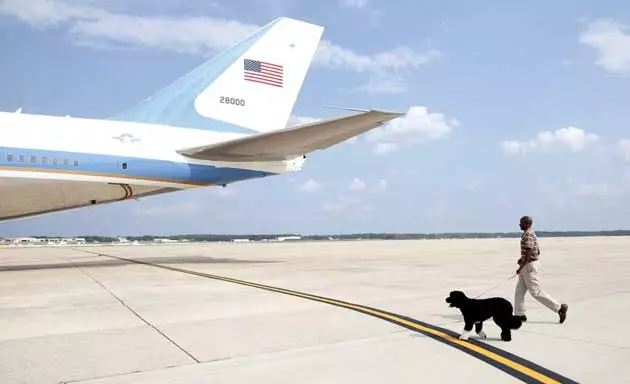
Bo, the dog of President Obama, sure has no problem when it comes to travel
Having a pet is more than just games, joys, pampering and the odd mess in the house: they are headaches every time we plan a trip. In our country, 26% of households have pets: some five million dogs and some three million three hundred thousand cats live with families throughout the year ( data from the ** Affinity Foundation ** ) and when the time comes to take a trip, transporting them or leaving them to an acquaintance becomes a problem... or not.
Every year, hotel establishments become more aware that the 26% of Spanish families with pets is real and represents a good percentage when it comes to occupying their places: providing facilities not only for the family, but also for the animal, is becoming a plus in the cover letter of the hotel in question. The Affinity Foundation's Guide to Traveling with Pets collects them each year in an exhaustive list that thickens its pages year after year. In addition to the typical but never redundant 'practical advice', the guide presents a list of hotels, rural houses and campsites where (a priori) animals are allowed, in addition to collecting veterinary hospitals open 24 hours and residences for dogs and cats: all the possible options so that your pet is taken care of and peace of mind allows you to travel without worries.
Maria Azkargorta, President of the Affinity Foundation, She affirms that “the owners are aware that traveling with their pet is not easy” but that “in Spain there is still a long way to go, especially if we compare the situation with other countries such as France or Germany”. Even so, Azkargorta tells us, “ There are already 8,200 Spanish establishments between campsites, rural houses and hotels , in which pets are allowed" although it is recommended to call in advance to confirm it, since sometimes there are restrictions due to the size of the animal, changes in management decisions...
It is essential to plan the transfer well, in what means of transport you travel and what regulations each of the airlines has (for example, low-cost airlines like Ryanair or Easy Jet do not allow pets except for guide dogs, although Vueling does), bus fleets or RENFE. Therefore, if the idea is to make a long trip and none of the options seems optimal for our pet , it is preferable to leave it at home with regular visits from a friend, or even opt for a residence (where María Azkargorta recommends that our dog or cat spend a test night before the final move) .
International travel means playing in another division. Irene Serrano is the owner of Manuela and Úrsula, two cats that will travel with her to Montreal, Canada, where they will live for a season: The first step for Irene was to find a company that fly directly to your destination (Air Transat) to avoid further delays at the time of the trip and of course, pay a ticket for each of the cats (about €180 each). After looking for a place to stay for the first few days that admitted animals and was not excessively expensive, his concern moved to the previous preparations: the documentation (luckily, in Canada a translated certificate of rabies vaccinations is sufficient), the carrier (a larger one for the comfort of the trip) or possible medication to sedate the animal in the first hours of the journey .
But behind all the headaches, one thing is clear: pets are part of the family nucleus ; the transfer is a good option as long as some of the tips are followed summarized by María Azkargorta as “that they are accustomed from childhood to travel, in addition to socializing (expose them to as many stimuli as possible), plan the trip in advance to avoid unpleasant surprises and visit the vet and hairdresser previously". Irene is well aware of this and is therefore trying to make the trip much more bearable for her two cats so that she can live with them in Montreal: "I didn't even consider leaving them in Spain, they are part of the family and, furthermore, they suffer with the change of owner ”.
There is still a long way to go in Spain so that 26% of Spanish families can travel with their animals, or they do not feel in a bind by not being able to transport them to avoid stress and discomfort to the animal, but the figures that reflect associations such as Affinity are optimistic. However, it must be taken into account that pets can be a nuisance for other passengers or guests and therefore, the first step to make the transport and stay of animals a regular issue, is that, as Azkargorta correctly states, "The owners must be aware at all times that they are representing the rest of the users."
